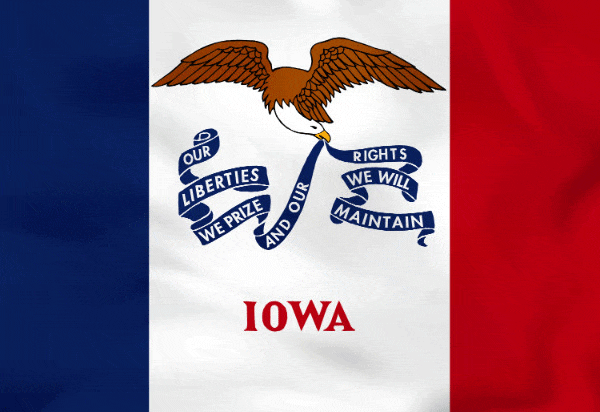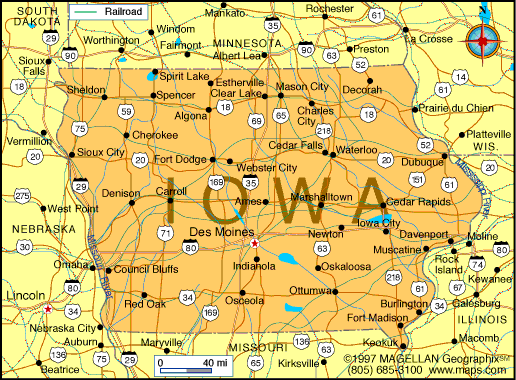

Iowa State Facts
Entered Union: Dec. 28, 1846 (29th State)
Organized as territory: June 12, 1838
Present constitution adopted: 1857
Fun Facts
State abbreviation/Postal code: Iowa/IA
Nickname: The Hawkeye State
Origin of name: From the Iowa River, which was named after the Ioway (or Báxoǰe) people.
Motto: “Our liberties we prize and our rights we will maintain”
State symbols:
Bird: Eastern goldfinch (1933)
Flower: Wild rose (1897)
Tree: Oak (1961)
Rock: Geode (1967)
Colors: Red, white, and blue (in state flag)
Song: "Song of Iowa"
Government
Capital: Des Moines
U.S. Representatives: 4
Population
Residents: Iowan
Resident population: 3,123,899 (30th Largest State, 2015)
10 largest cities (2014): Des Moines, 206,688; Cedar Rapids, 128,119; Davenport, 101,363; Sioux City, 82,719; Iowa City, 70,133; Waterloo, 68,297; Council Bluffs, 62,115; Ames, 60,634; West Des Moines, 59,296; Dubuque, 58,155;
Economy
GDP: 185 billion dollars (29th in U.S., 2016)
Unemployment: 3.4% (2015)
Overview: Iowa's largest industries are manufacturing and agriculture. Iowa leads the nation in corn and soybean production and comes in third in total livestock sales. Local manufacturing is largely focused around food processing and heavy machinery. Iowa is home to a large number of insurance and financial groups, as well as a notable publishing industry.
Geography
Land area: 55,869 sq mi. (144,701 sq km)
Geographic center: In Story County, 5 mi. NE of Ames
Number of counties: 99
Largest county by population and area: Polk, 444,009 (2014); Kossuth, 973 sq mi.
State forests: 10 (43,917 ac.)
State parks/recreation areas: 84 (53,000 ac.)
Iowa State History
The most powerful "native" nations in present-day Iowa were the Sauk and the Meskwaki. These related peoples were driven west—by the Haudenosaunee and then the French—coming to Iowa in the 1700s. The first Europeans to visit the area were French explorers Jacques Marquette and Louis Joliet in 1673. The U.S. obtained the land in 1803 as part of the Louisiana Purchase.
For the next several decades Iowa would be known as the Iowa Indian Territory. Conflict between natives and settlers in Illinois culminated in the United States forcing the people of the Upper Mississippi onto the west bank of the river (out of Illinois and into Iowa). This lead to the Black Hawk War in 1832, and again in 1837. The United States displaced every native nation by 1852; the native population in Iowa today descends from Meskwaki and Sauk who later bought back land from the state.
When Iowa became a state in 1846, its capital was Iowa City; the more centrally located Des Moines became the new capital in 1857. During this time, large numbers of European settlers immigrated to the Midwest where there was abundant farmland. The settlers were a major motivator for the development of the state railroads in the 1850s. Iowans voted overwhelmingly for Abraham Lincoln, and sent 75,000 troops to fight for the Union in the Civil War.
In the 1930s Iowa was hit by the agricultural troubles that plagued the rest of the U.S. The hardship prompted proud Iowan Henry A. Wallace to create our modern system of farm subsidies—paying farmers to not plant all of their fields, allowing crop prices to stabilize and soil to recover. Iowan Nobel Prize winner Norman Borlaug won his prize in the 1940s for his research on plants. In the decades since, Iowa's most significant change has been the growth of its manufacturing sector.
For the aspiring visitor, tourist attractions include the Herbert Hoover birthplace and library near West Branch; the Amana Colonies; Fort Dodge Historical Museum, Fort, and Stockade; and the Effigy Mounds National Monument.
Iowa Culture and Interesting Facts
The Iowa State Fair
One of Iowa’s most popular and iconic events is its state fair. The Iowa State Fair began as a rather small event in the 1850s. Today the fair attracts over a million visitors each year. The fair features traditional elements like carnival rides, agricultural contests, and fair food (corn dogs, fried oreos, and so on). Perhaps its most famous feature is its annual butter sculpture; every year since 1911 sculptors have made elaborate sculptures out of butter ranging from John Deere tractors to Da Vinci’s Last Supper. The state fair is the setting of the musical State Fair.
The Hawkeye State
The history of “the Hawkeye State” is a bit convoluted. In 1826 American author James Fenimore Cooper wrote The Last of the Mohicans; the main character is a white marksman who is given the honorary nickname “Hawkeye” by the Delaware people in recognition of his talents. What does this have to do with Iowa? Well, in 1833 the Black Hawk War broke out. An Iowa newspaper publisher decided to change the name of his paper to The Hawk-eye to commemorate Black Hawk. This would eventually lead to Iowa becoming “The Hawkeye State” as we know it today.
The Iowa Hawkeyes
The state lends its nickname to the sports teams of University of Iowa, the Hawkeyes. The Hawkeyes have performed well across a wide range of varsity sports (like wrestling). Their football team is especially well-known. The Hawkeyes are one of the most valuable college football teams in the country and have been part of the Big Ten Division (the highest level of college football) for nearly a century. They have participated in over 30 major college bowls.
The Iowa Writers’ Workshop
University of Iowa doesn’t just have excellent athletics. Their graduate program in Creative Writing, also known as the Iowa Writers’ Workshop, is widely considered the best writing program in the United States (and by extension one of the best creative writing programs worldwide). The workshop consistently churns out some of the country’s most widely read and regarded authors. Because of the workshop's reputation, Iowa City was the first city in the U.S. to be designated a "City of Literature" by UNESCO.
The Iowa Caucuses
Another one of Iowa’s claims to fame is that they are the first state in the country to get engaged in the presidential process. Political caucuses are a kind preliminary election; unlike the better known “primary,” a caucus is only available to registered party members. The Iowa Caucuses are special because they are the first test for candidates to gauge their chances at being nominated for the presidency. If a candidate performs poorly in their party’s caucus, they will often withdraw from the race in a matter of days.

No comments:
Post a Comment